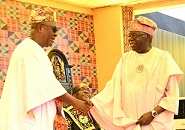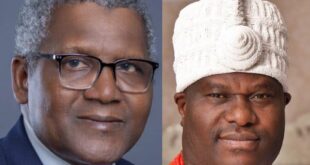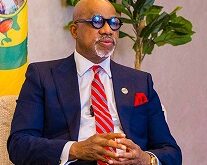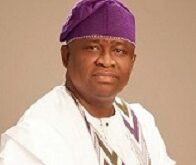Opinion:
BY ABIODUN KOMOLAFE#
Nigeria’s self-proclaimed status as the ‘Giant of Africa’ is being questioned once again, and a recent example from Ghana highlights this reality. The ruling New Patriotic Party (NPP) in Ghana conceded defeat even before the polls closed, showcasing a level of democratic maturity. This incident serves as a reminder that Nigeria’s claim to being a giant may not be entirely justified, considering factors beyond mere size or population.
To begin with, a lot of what happened in Ghana was a stark and painful reminder that Nigeria is not a competitive political economy. The sooner we face this reality, the better! Ghana’s ruling party, the NPP, was ready to concede defeat, even before the polls closed, because its own exit polls had shown that the opposition National Democratic Congress (NDC) was already having a massive, irreversible lead in the voting.
The key issue is that you must have a competitive economy to even measure the temperature of exit polls. A country must have data to have exit polls. So, which exit polls do we have in Nigeria and why do we not have exit polls? The modern economy is data-driven, and it is clear that Nigeria’s economy is not data-driven. This is the key fault-line that must be urgently rectified in order to build a proper economy with the condition of today’s world.
Fundamentally, the Electoral Commission of Ghana (EC) was transparently independent of the ruling party. This reality was accepted as an incontestable fact by both the political and the civil society organizations. The EC Head, like Caesar’s wife, was above board. Even in the parliamentary constituencies, nobody is talking about ‘going to court’. It is ironic that the Head of Nigeria’s Independent National Electoral Commission (INEC) was in Ghana and one hopes that he’d publish the full report of his assessment of the electoral process, including the collation and transmission or results.
Just as the EC demonstrated its independence, elections also serve as crucial indicators of a nation’s economic stability. An election is not just about the rights of voters in a democracy, it is also a signal to credit analysts as well as potential investors about the fundamental structure, orientation and competitiveness of a nation’s economy. Very importantly, it is about the stability of its institutions. In every electoral cycle, a country sends out signals about its economic stability in the short-, medium-, and long-term. Elections are actually very key economic indicators!
Ghana is different from Nigeria because its two major political parties – the NDC and the NPP – are institutional memories of Ghana’s political history, going back to the days of the Gold Coast before the country was renamed as Ghana. The two political parties represent the split in 1949 from the original nationalist movement. The NDC represents the ideological fervor of the younger elements such as Archie Casely-Hayford, Kwameh Nkrumah and others, who left to form the more progressive-oriented Convention People’s Party (CPP). The NPP represents the more conservative elements such as J.B. Danquah, Joe Appiah and others, who stayed with the conservative tendency. This ideological divide, in one shape or another, has dominated and continues to be the central thrust of Ghana’s politics from 1949 till today. This is why we do not have people decamping from party to party.
In 8 years in the opposition party, we did not hear of any notable, even inconsequential decampees from the NDC to the ruling NPP. You can place a safe bet that nobody is going to decamp from the NPP to the now-ruling NDC in the next four years. This is because, unlike in Nigeria, the ideological basis upon which politics is anchored is very well-structured and institutionalized. We may care to ask ourselves: ‘What institutional memories and values, shaped by over 80 years of history, do Nigeria’s major political parties – APC, PDP, Labour Party, and others – truly represent? Yes, there’s poverty in Ghana, but this has not led to people jumping from party to party, looking for something to eat!
A closer look at Mexico’s political landscape is instructive. The country’s political parties, like the Institutional Revolutionary Party (Partido Revolucionario Institucional, PRI), and the National Action Party (Partido Acción Nacional, PAN), are more than just parties – they’re movements with deep roots. If a local councilor defects, it’s front-page news. These parties even have their own banks, offering loans to members. In Nigeria, where is the People’s Democratic Party (PDP) Bank and where is the All Progressives Congress (APC) Hospital? This disparity highlights Nigeria’s struggles with building robust, ideologically-driven political parties.
Similarly, in Nigeria, the absence of robust research departments in political parties hinders their ability to drive effective governance. A proper political party must have a Research Department. It is the fruit of research over the years that leads to effective governance. When they were in opposition in Brazil, the Workers’ Party (Partido dos Trabalhadores, PT) simulated the building of affordable housing on a mass scale for low income people to purchase on a monthly rent-to-home basis. By the time they came into office, they had worked out cost-effective, mass housing construction solutions, based on local materials.
In 8 years in office, they built 1,000,000 affordable housing units per year and, in the process pulled millions of people out of poverty, created generational wealth and built enduring social capital. To be honest, the Lagos Executive Development Board (LEDB) in the 1950s, and Lateef Jakande in the early 1980s, were also on this trajectory. Unfortunately, no political party since then has imbibed the institutional memory to build upon them.
What Ghana, Mexico, South Africa and Brazil, even India have shown is that Nigeria needs solidly-structured, ideologically-cohesive and data-driven political parties to have real, sustainable development as opposed to booty-sharing which inevitably leads to unsustainable cost of governance. We had better consider the consequences of a country spending more on debt servicing than investments in education and health, and how this affects sustainable development. This is bizarre! It defies commonsense and it’s not aligned to any known model of economic development!
The success of the transfer of power in Ghana should be for us in Nigeria an opportunity for introspection and very sober reflection. It should also be a wakeup call to reboot our political process in order to regain international competitiveness. International competitiveness is now make-or-break, with Trump 2.0 manifesting itself on January 20! This should be taken as a warning! The problem with our political leaders in Nigeria is that they don’t invest in the institutions or people, but in themselves. Of course, that’s why they don’t quit, resign or retire but, like water, at the mercy of temperature, they move from one state of coldness to another of hotness. They undergo constant transformation, yet remain inherently unchanged.
Like a butterfly flitting from flower to flower in search of nectar, these leaders move from one position of power to another, leaving behind a trail of fake promises and superficial solutions. This self-serving approach is rooted in a deeper societal issue – a culture of entitlement and lack of accountability – which perpetuates the suffering of a people whose promise has been aborted, at the hands of “hypocritical praise singers and men with hardened hearts and closed ears” who “believe in nothing but their own voices of lies.”
This self-serving approach has far-reaching consequences, as evident in the 2023 presidential election, where the IReV Portal lost its authentic ring. Who knows what aspect of our fragile democratic processes will “succumb to the tempting froth from the cup of politics” in 2027?
May the Lamb of God, who takes away the sin of the world, grant us peace in Nigeria!
*ABIODUN KOMOLAFE writes from Ijebu-Jesa, Osun State, Nigeria. (ijebujesa@yahoo.co.uk)
 Startrend International Magazine For Your Latest News And Entertainment Gists
Startrend International Magazine For Your Latest News And Entertainment Gists





